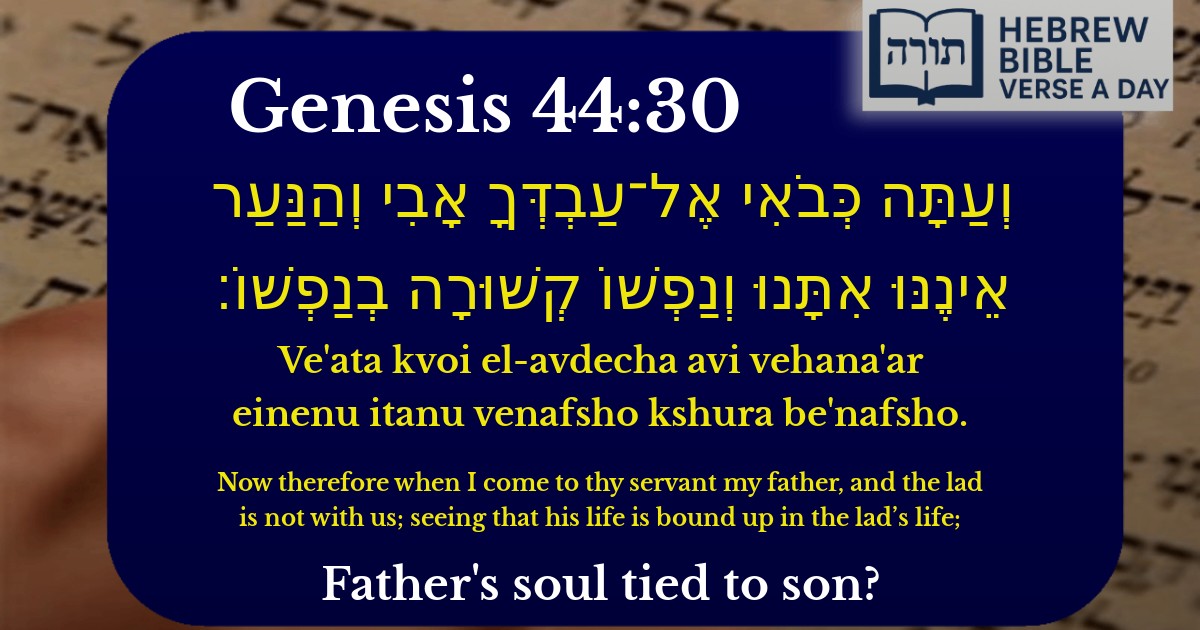Join Our Newsletter To Be Informed When New Videos Are Posted
Join the thousands of fellow Studends who rely on our videos to learn how to read the bible in Hebrew for free!
Hebrew Text
וְעַתָּה כְּבֹאִי אֶל־עַבְדְּךָ אָבִי וְהַנַּעַר אֵינֶנּוּ אִתָּנוּ וְנַפְשׁוֹ קְשׁוּרָה בְנַפְשׁוֹ׃
English Translation
Now therefore when I come to thy servant my father, and the lad is not with us; seeing that his life is bound up in the lad’s life;
Transliteration
Ve'ata kvoi el-avdecha avi vehana'ar einenu itanu venafsho kshura be'nafsho.
Hebrew Leining Text
וְעַתָּ֗ה כְּבֹאִי֙ אֶל־עַבְדְּךָ֣ אָבִ֔י וְהַנַּ֖עַר אֵינֶ֣נּוּ אִתָּ֑נוּ וְנַפְשׁ֖וֹ קְשׁוּרָ֥ה בְנַפְשֽׁוֹ׃
וְעַתָּ֗ה כְּבֹאִי֙ אֶל־עַבְדְּךָ֣ אָבִ֔י וְהַנַּ֖עַר אֵינֶ֣נּוּ אִתָּ֑נוּ וְנַפְשׁ֖וֹ קְשׁוּרָ֥ה בְנַפְשֽׁוֹ׃
🎵 Listen to leining
Parasha Commentary
📚 Talmud Citations
This verse is quoted in the Talmud.
📖 Chullin 95b
The verse is referenced in a discussion about the emotional bond between parents and children, illustrating how deeply a father's life is connected to his child's.


Context of the Verse
This verse (Bereshit 44:30) is part of Yehuda's impassioned plea to Yosef (still unrecognized as the viceroy of Egypt) to spare Binyamin and allow him to return to their father Yaakov. Yehuda emphasizes the deep emotional bond between Yaakov and Binyamin, fearing that Yaakov's life would be endangered if Binyamin did not return.
Rashi's Explanation
Rashi comments on the phrase "וְנַפְשׁוֹ קְשׁוּרָה בְנַפְשׁוֹ" ("his life is bound up in the lad's life") by explaining that Yaakov's soul was so deeply connected to Binyamin's that if Binyamin were harmed, Yaakov would not survive the grief. Rashi cites the Midrash (Bereshit Rabbah 91:10) which compares this bond to two intertwined flames—when one is extinguished, the other flickers and weakens as well.
Rambam's Perspective
Rambam (Hilchot Aveilut 13:12) discusses the profound emotional and psychological impact of losing a child, which aligns with Yehuda's concern for Yaakov. He notes that a parent's love for a child is intrinsic and unbreakable, and the loss can be devastating—reinforcing Yehuda's argument that Yaakov's survival depends on Binyamin's return.
Midrashic Insights
Halachic and Ethical Implications
The Talmud (Sanhedrin 19b) derives from this verse the principle of "חיי אדם תלויים בחברו" ("one person's life is dependent on another"), emphasizing the moral responsibility we have toward others' emotional and physical well-being. Yehuda's words serve as a model for advocating on behalf of those who are vulnerable.
Linguistic Nuances
The term "קשורה" ("bound") suggests an inseparable connection, akin to the binding of the Akeidah (the binding of Yitzchak). This language underscores the depth of Yaakov's attachment, implying that Binyamin's absence would be as devastating as a physical severance.